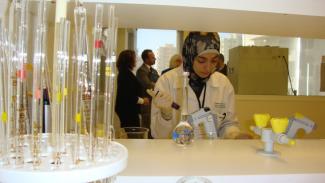Lebanon has the highest proportion of cultivable land, per capita, in the Arab world. Approximately 60 percent of citizens outside greater Beirut rely on agriculture—directly or indirectly—and related industries for some form of household income; yet, the Lebanese agribusiness sector is underutilized. Food insecurity is also a problem. Lebanese President Michel Sleiman noted in August 2012 that “28.5 percent of people in Lebanon live in poverty, with eight percent in extreme poverty, surviving on less than $2.4 per day. Around 300,000 people are unable to meet their basic food needs.”
Understanding that agriculture affects everyone in Lebanon, whether a farmer or a consumer, USAID programs work to strengthen food safety by upgrading food testing laboratories to comply with export market food standards, as well as make agribusinesses more efficient and demand driven, and increase income generation for rural populations.
In cooperation with the Chambers of Commerce, Industry, and Agriculture, USAID has had important impacts in this sector, including:
- Increasing domestic sales and international exports of high-value fruits, vegetables and flowers by building the technical capability and capacity of domestic greenhouses to convert to hydroponic production and strengthening their links to the horticulture export market.
- Upgrading the certification, capacity and quality of Lebanese agricultural laboratories and agricultural product development plants to create certified and internationally recognized “one-stop-export shops.”

USAID
